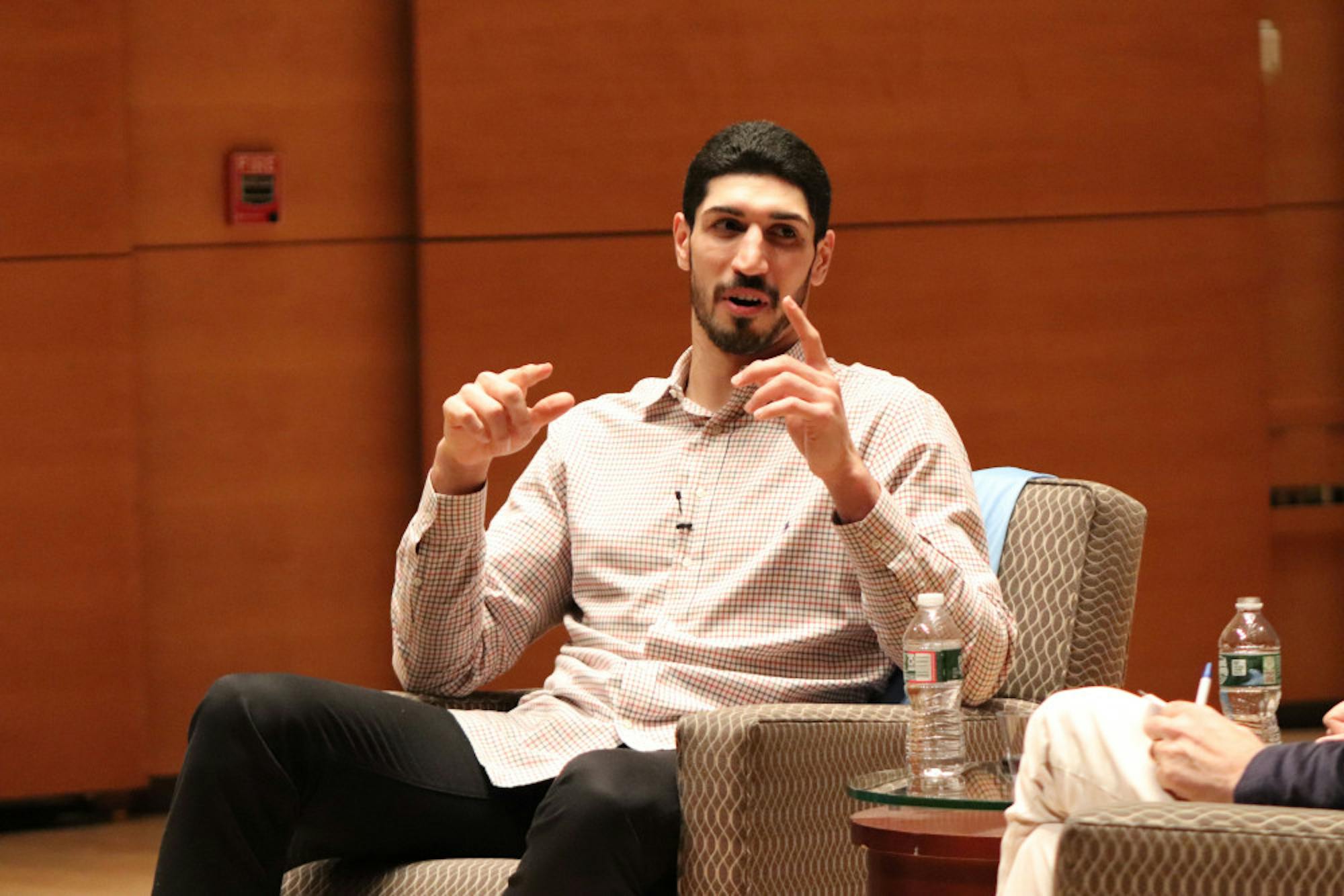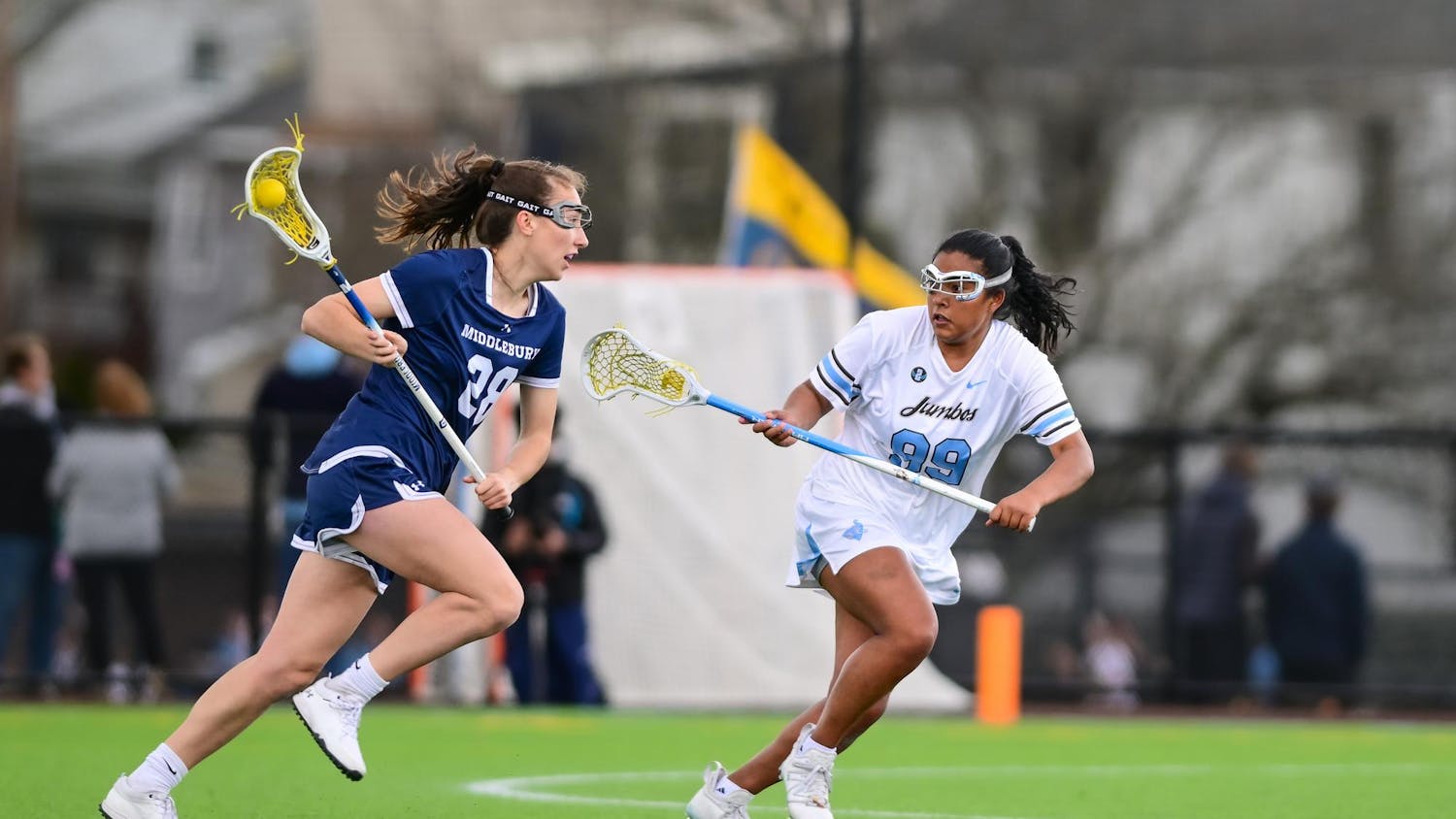Boston Celtics center Enes Kanter came to Tufts to speak on Friday, and gave an exclusive interview to the Daily staff. Executive Sports Editor Jake Freudberg, Managing Editor Alex Viveros, sports staff writer Alex Sharp, former Managing Editor Caleb Symons and news contributing writer Tom Guan sat down for a brief discussion with Kanter.
Tufts Daily (TD): How did you end up at Tufts?
Enes Kanter (EK): I had a friend here actually, and they invited me. I said yeah, it’s an honor. It’s one of the best universities in the nation. So, I was like yeah ok, it’ll be an honor.
TD: Regarding your public criticisms of the political situation in Turkey, how do you feel about the future?
EK: I’m always hopeful. That’s why I’m always still talking about it and having these conversations. I’m still trying to fight what’s going on over there. And, just because I have a platform, I’m trying to use that platform to help all those innocent people who don’t have one. So I think it’s very important to use the platform.
TD: Are you involved in American politics? Do you have an opinion about what’s going on right now?
EK: I actually am. I’ve been watching the debates, and I’ve been watching what’s going on with the Republicans and Democrats. But I think just one thing they should be focused on is not going at each other but trying to bring peace and love in this country. I feel like sometimes they forget what the main goal is.
TD: How did your charter school project come about? What do you envision for that?
EK: I always want to give back to America. I think that’s the best way to give back to America — with education. I feel like if you invest in our future, that will be the best thing because I think, with our young generation, we can have a better and brighter future. It’s definitely the best investment that we can have.
TD: Talking about basketball, what do you think the role of the big man is now in the NBA?
EK: In the NBA, obviously, the NBA has changed a lot, man. You always see people pick and popping, shooting threes, and after what Golden State did to NBA in basketball, they just changed everything. It’s changed, but you’ve got to be able to change with the NBA. You can be always working on your game and pick and roll, but also pick and pop, and be able to shoot that open three. It’s always in your head.
TD: Why did you choose the number 11?
EK: You already know.
TD: We saw you met with the Attorney General Maura Healey a few months ago. What was that like? What did it mean to have her support? What would you say about Boston and Massachusetts in general?
EK: Actually, one of the biggest reasons why I wanted to come to Boston was because the city is one of the most educated. And people know what’s going on, not just on the court, but off the court too. Even with some of the lawmakers, senators, congressmen, congresswomen, attorney generals — seeing their support definitely gives me so much hope. Especially because [Healey] played basketball at Harvard, so she understands basketball language and she understands my conversation off the court. So, to see her support is amazing.
TD: Who do you think the best big man is in the NBA?
EK: Oh, it’s tough. I would say either [Nikola] Jokic or [Joel] Embiid. I don’t count [Anthony] Davis as a big man because he’s a four man. If you’re talking about a five man, I would say Jokic or Embiid.
TD: What do you think about what happened with James Wiseman with Memphis?
EK: It’s sad, man. Like I said again, it’s sad. The NCAA is making billions and billions and seeing these kids and what they’re going through hurts my heart. My situation was different. I came from Turkey, so I was an international player. But now this NCAA stuff is going on and people are scared to come to the NCAA. People are like, ‘Am I going to have an eligibility problem? What’s going to happen? Did I take money? What should I do?’ I feel like the rules definitely need to change because it’s very strict. It kind of feels like a dictatorship. Seriously.
TD: What do you think about paying college basketball players?
EK: The NCAA is making billions. Crazy money. But you can’t even buy a meal for a college athlete? That doesn’t make sense. I feel like that’s why a lot of players are going to be skipping college. The rules are changing now — I don’t know if it’s still the same or not. But before, it was right from high school to the NBA. But now you have to go to college. They might change the rule again. I think yes, they should.
TD: Have you found that students from abroad, not just Turkey, are dissuaded from playing college basketball?
EK: They’re scared because they don’t know what they’re going to face. Me, I turned down millions of dollars just to go play college basketball. And it was very frustrating because I turned down lots of money just to come here and go play college basketball. I mean, come on man. But now, after what happened to myself and a few other international players, I heard that in some other countries that players are scared, and parents don’t want to send their kids to the NCAA because of all of these issues.
TD: And those kids have to make a decision: basketball or education?
EK: Here, it’s not like overseas where you have to pick one. Here, you can go to school and play basketball at the same time. And your grades actually matter; you need to go to school.
TD: What would you give as advice to immigrant kids coming to this country now?
EK: I would just say this: don’t feel ashamed of anything. Coming here from a different color, religion, culture or language, you kind of feel ashamed sometimes. I’ll just say this: just know that it’s going to be your home and try to get used to it. The food, the culture — to try to understand people. Always try to learn about others so that you can respect them, and they can respect you.
Enes Kanter Q&A

Boston Celtics player Enes Kanter speaks in front of members of the Tufts community in Distler Performance Hall on Feb. 28.





